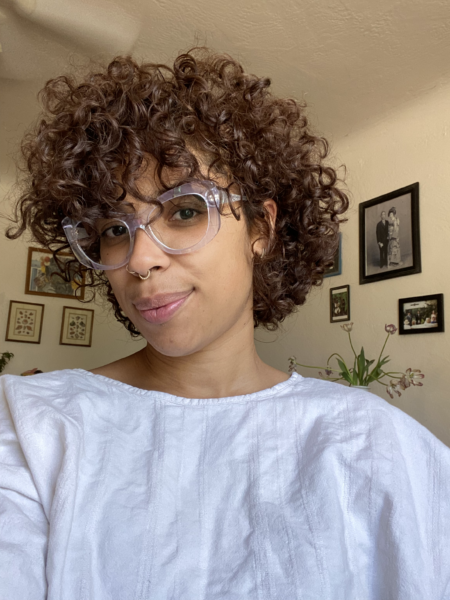
We recently spoke with Nightboat’s inaugural Editorial Fellow, Naima Yael Tokunow, about the creative process of editing, how she found her way to the a/Archive, and what she looks for in a piece of writing. We’re so excited to publish her anthology project, Permanent Record, in 2024.
Nightboat: What led you to an interest in the a/Archive, as both (as you describe it) “the commodification of shared cultural recording” and as a “counter-practice”?
Naima Yael Tokunow: The recorded lives of Black American families are like spider webs—ephemeral, tenuous, glittering—so often, we have not been afforded the privilege of remembrance, and so often, our lives show up like shadows on a scrim, fleeting and mysterious. I started an ancestry research project to connect to family that has largely been unknown to me, and out of that came a book project that I used as a tool to heal the harms of the racist, classist, war-machine of American record-keeping (the Archive), filling the gaps with my own “rememberings” influenced by divination, imagination, and Afrofuturist reflections (the archive).
That project led me to larger questions around canon, bureaucracy, sovereignty (both of land and body), around language and place and homeland, and how all of what we know (and how we know) is shaped by what is (mis)remembered, recorded/unrecorded, and how we can continue to get closer to a radically free future by (re)creating the ways in which we hold our histories—leaning into our own gifts as seers and knowers of what has come and what is to come.
I wanted to bring these questions to the field and give folks an opportunity to answer. I hope this book, which is, of course, its own record, will work to open up a portal, both past and future facing, and to ask its reader to engage deeply with the idea of what (and who and how) makes up the documents, evidence, and ledgers of our shared and discrete lived experiences.
NB: How do you feel editorial practice relates to the larger literary field? What responsibilities do you feel editors have to their writers?
Naima Yael Tokunow: One of my grad school mentors, Carmen Gimenez, taught a class on “literary citizenship,” that our role as poets in the world wasn’t only to write, but to engage with others with generosity and rigor. That really stuck with me, thinking of poetry as a nation that I pledge my allegiance to, as a citizen of that space that has a responsibility to its health and future. The work of making poems alone isn’t enough. I think editors owe their writers growth and openness and flexibility and attentive support. I think editors owe their writers continuing ed—you know, editors are not the arbiters of taste, we don’t magically know everything, we don’t wield anointed wands (although sometimes power is weaponized like that in the field). We need to keep learning and stretching to best meet the writers we support.
NB: In what way(s) does editorial work feed your own poetry?
Naima Yael Tokunow: A moment of radical honesty: in my personal life, I am a slow, slow reader of poetry. So doing editing work forces me (forces sounds non-consensual, but it’s not!) to read higher volume, and generous reading asks me to check what I think is “good” or what I “like” all the time. I work hard to not be an editor so obsessed with my own personal aesthetic choices that strong, vital work gets left out of the project. As an editor, I want to be a conduit, not a gatekeeper.
This kind of editorial practice makes me a better reader and writer. I am regularly inspired by new work that I read, and that inspiration leads to fun experimentation with my own work.
NB: You’re almost at the midway point of the fellowship! Do you have any reflections on the evolution of your project or the fellowship at this stage? How has working with the Nightboat team helped to shape Permanent Record?
Naima Yael Tokunow: Oh man! Permanent Record could and would literally not be without the Nightboat team. I have learned so much about small press publishing, have been held in tenderness and support, and in the development stage, when we were pulling out the detailed framework of the book from my more abstract proposal, I so valued their expert crafting brains. The sharpness of the call language, which was edited by the whole team, brought us brilliant, scary, beautiful, hilarious, hard and good work that I’m going to be really proud to share with the world. This fellowship has been incredible empowering and I hope that more presses take Nightboat’s lead and offer emerging editors the opportunity to deepen and sharpen their toolbox, because this has been incredible.
NB: What moves you in a piece writing, makes you sit up and take notice?
Naima Yael Tokunow: That’s such a hard question because there isn’t one universal move or use of language or form that acts as a special key, but I would say that I do love work that uses rich language (I love sound!), that makes me think and question and work to get through it (with some shared understanding that we can on the other side, I don’t enjoy work that is complicated or hard to access for complexity’s sake alone). I love unusual image systems and lyrical surprises. I like poems that teach me how to read them, work that engages in new forms, or makes old forms feel juicy again. I come to poetry to feel more connected (to myself, or the speaker, the world, the future, etc.) and poems that do that well are special gifts. I’m also a visual artist and so I am too drawn to work that uses images/visual elements. Poetry is so wild and abundant in that so many poems are the perfect poem, you know?
